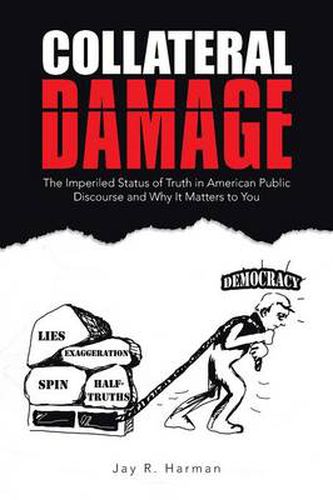Readings Newsletter
Become a Readings Member to make your shopping experience even easier.
Sign in or sign up for free!
You’re not far away from qualifying for FREE standard shipping within Australia
You’ve qualified for FREE standard shipping within Australia
The cart is loading…






This title is printed to order. This book may have been self-published. If so, we cannot guarantee the quality of the content. In the main most books will have gone through the editing process however some may not. We therefore suggest that you be aware of this before ordering this book. If in doubt check either the author or publisher’s details as we are unable to accept any returns unless they are faulty. Please contact us if you have any questions.
This book is an inquiry into the harms being done by untruthfulness in American popular political discourse today and how we might arrest them. Taking the form of claims and counterclaims, this untruthfulness is both accidental and intentional and is transmitted in a myriad of media outlets as well as (and especially) by politicians themselves. In turn, we, as consumers of these products, face the daunting task of separating truth from spin, hyperbole, half-truths, and outright prevarication. With the proliferation of various fact-checking websites on the Internet, one might think that corroborating the accuracy of various claims is easier than ever. Unfortunately, many of us seem just as ready to accept the line from partisan websites and agenda-driven think tanks as we are to ferret out alternative interpretations, leaving us with views that are often reinforced rather than tested and unable to distinguish fact from fiction. As a result, untruths and exaggeration, once planted in the public narrative, acquire lives of their own in subsequent discourse. There is no wonder that polls consistently show that Americans are confused about basic issues or policies and even scientific facts themselves. All of this is more than an annoyance if it cripples our performance as voters. How can we be expected to make informed choices at the polls if we are befuddled by what we read or hear? And if we are befuddled, how can we be expected to identify those candidates most likely to lead our democracy forward in the twenty-first century? Collateral Damage considers the many forms untruthfulness assumes in public discourse, why it seems to be so common and widespread, and offers some suggestions on how we might address it. While the author jokes that this book may appear to be little more than the machinations of a third-rate mind, it is heartfelt and on-target, nonetheless.
$9.00 standard shipping within Australia
FREE standard shipping within Australia for orders over $100.00
Express & International shipping calculated at checkout
Stock availability can be subject to change without notice. We recommend calling the shop or contacting our online team to check availability of low stock items. Please see our Shopping Online page for more details.
This title is printed to order. This book may have been self-published. If so, we cannot guarantee the quality of the content. In the main most books will have gone through the editing process however some may not. We therefore suggest that you be aware of this before ordering this book. If in doubt check either the author or publisher’s details as we are unable to accept any returns unless they are faulty. Please contact us if you have any questions.
This book is an inquiry into the harms being done by untruthfulness in American popular political discourse today and how we might arrest them. Taking the form of claims and counterclaims, this untruthfulness is both accidental and intentional and is transmitted in a myriad of media outlets as well as (and especially) by politicians themselves. In turn, we, as consumers of these products, face the daunting task of separating truth from spin, hyperbole, half-truths, and outright prevarication. With the proliferation of various fact-checking websites on the Internet, one might think that corroborating the accuracy of various claims is easier than ever. Unfortunately, many of us seem just as ready to accept the line from partisan websites and agenda-driven think tanks as we are to ferret out alternative interpretations, leaving us with views that are often reinforced rather than tested and unable to distinguish fact from fiction. As a result, untruths and exaggeration, once planted in the public narrative, acquire lives of their own in subsequent discourse. There is no wonder that polls consistently show that Americans are confused about basic issues or policies and even scientific facts themselves. All of this is more than an annoyance if it cripples our performance as voters. How can we be expected to make informed choices at the polls if we are befuddled by what we read or hear? And if we are befuddled, how can we be expected to identify those candidates most likely to lead our democracy forward in the twenty-first century? Collateral Damage considers the many forms untruthfulness assumes in public discourse, why it seems to be so common and widespread, and offers some suggestions on how we might address it. While the author jokes that this book may appear to be little more than the machinations of a third-rate mind, it is heartfelt and on-target, nonetheless.